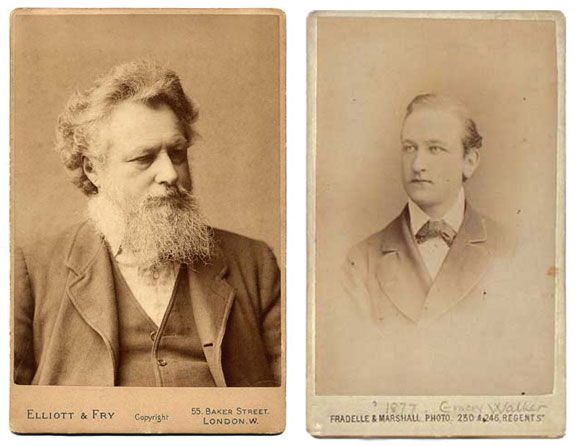August 13

A nice juxtaposition of images perhaps, but a complete fake chronologically speaking. The photograph of Morris on the left was taken in the late 1880s while the photograph of Emery Walker was taken in 1877 when he was a mere 26 years old. To picture it more accurately, imagine a slightly younger Morris and an older Walker.
William Morris, in a letter written on this day in 1884, mentions a Socialist meeting during which he held the chair. Quite possibly this was the meeting at which he met Emery Walker, as his daughter May Morris later wrote that the two men had met first at a Socialist meeting during 1884. The first letter written by Morris in which he mentions Walker’s name was written in December of that same year. While the two men became known to one another at that meeting, Walker was actually already known to the entire Morris family as a familiar figure who passed their home each day on his way to business. By 1888, however, Walker had become a motivating force in the life of William Morris.
Emery Walker was twenty-two years of age in 1873 when he joined with the firm operated by Alfred Dawson. This was the first photographic reproduction establishment in England. It presented Walker with the opportunity to become the most knowledgeable process engraver of his time. He gained the friendship and esteem of printers, publishers, and artists through the medium of his work, gradually acquiring a notable breadth of understanding of the graphic arts in both its technical and historical factors.
It was during the period following his meeting with Morris that the latter became thoroughly engrossed in the study of the work of the earliest printer. When Walker presented an illustrated lecture on Letterpress Printing in 1888, Morris attended. Here the spark was ignited. As the two men walked home from the lecture, Morris suddenly said, “Let’s make a new fount of type.” Thus the famous Kelmscott Press was born. Walker refused a partnership with Morris in the operation of the press, but he supplied the technical advice which Morris needed so badly.
Following the death of William Morris in 1896, Walker came to the aid of T.J. Cobden-Sanderson in the formation of the Doves Press, assisting in the selection of the types based upon a 15th century font of Nicholas Jenson. Walker also suggested the equipment to be purchased and aided in the actual production of the books which were printed. In Walker’s long service to the printing craft, his association with the Doves Press was the only instance in which he became involved in the actual printing of books, the format of which he helped to plan. It is unfortunate that the increasing neuroticism of Coben-Sanderson eventually led to a break between the partners, but Walker’s advice and counsel had already been a prime factor in the direction of the Doves Press. The establishing of two out of three great English private presses therefore may be credited to Emery Walker.
Walker’s good friend, Sir Sidney Cockerell, wrote of him in the obituary which appeared in the Dictionary of National Biography: “It is scarcely too much to say that his influence, direct or indirect, can be discerned in nearly every well-designed page of type that now appears, and that to him more than any other man this century’s great improvement in book product has been due.”